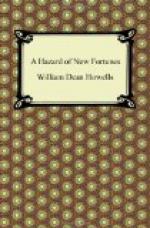“Well, do come along, then, mother,” said Mela; and she got her out of the room, with Mrs. Mandel’s help, and up the stairs.
From the top the old woman called down, “You tell Coonrod—” She stopped, and he heard her groan out, “My Lord! my Lord!”
He sat, one silence in the dining-room, where they had all lingered together, and in the library beyond the hireling watcher sat, another silence. The time passed, but neither moved, and the last noise in the house ceased, so that they heard each other breathe, and the vague, remote rumor of the city invaded the inner stillness. It grew louder toward morning, and then Dryfoos knew from the watcher’s deeper breathing that he had fallen into a doze.
He crept by him to the drawing-room, where his son was; the place was full of the awful sweetness of the flowers that Fulkerson had brought, and that lay above the pulseless breast. The old man turned up a burner in the chandelier, and stood looking on the majestic serenity of the dead face.
He could not move when he saw his wife coming down the stairway in the hall. She was in her long, white flannel bed gown, and the candle she carried shook with her nervous tremor. He thought she might be walking in her sleep, but she said, quite simply, “I woke up, and I couldn’t git to sleep ag’in without comin’ to have a look.” She stood beside their dead son with him, “well, he’s beautiful, Jacob. He was the prettiest baby! And he was always good, Coonrod was; I’ll say that for him. I don’t believe he ever give me a minute’s care in his whole life. I reckon I liked him about the best of all the children; but I don’t know as I ever done much to show it. But you was always good to him, Jacob; you always done the best for him, ever since he was a little feller. I used to be afraid you’d spoil him sometimes in them days; but I guess you’re glad now for every time you didn’t cross him. I don’t suppose since the twins died you ever hit him a lick.” She stooped and peered closer at the face. “Why, Jacob, what’s that there by his pore eye?” Dryfoos saw it, too, the wound that he had feared to look for, and that now seemed to redden on his sight. He broke into a low, wavering cry, like a child’s in despair, like an animal’s in terror, like a soul’s in the anguish of remorse.
VII.
The evening after the funeral, while the Marches sat together talking it over, and making approaches, through its shadow, to the question of their own future, which it involved, they were startled by the twitter of the electric bell at their apartment door. It was really not so late as the children’s having gone to bed made it seem; but at nine o’clock it was too late for any probable visitor except Fulkerson. It might be he, and March was glad to postpone the impending question to his curiosity concerning the immediate business Fulkerson might have with him. He went himself to the door, and confronted there a lady deeply veiled in black and attended by a very decorous serving-woman.




